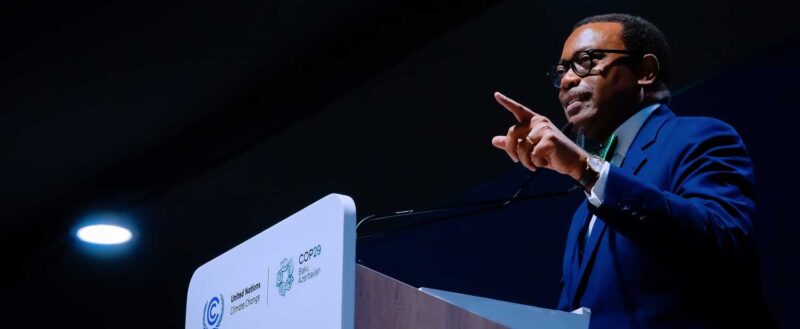President of the Africa Development Bank, Akinwumi Adesina has expressed concerns over what he terms as a worrying trend of 'carbon grab' across Africa.
According to the top development banker, Several African countries are giving away their vast amounts of land to carbon credits.
“While this may generate some short-term financing, it needs to be understood that Africa is a carbon price taker and therefore is short-changed”.
Mr Adesina further explained while the price of carbon in Europe is high and could be as high as $200 per ton because of the strict EU Emission Trading Standards, carbon price in Africa could be as low as $3 to $10 per ton.
This development he argued portends some existential threats to African countries.
“First, the countries are being underpaid for the carbon, due to the undervaluation of Africa’s carbon sinks. Second, the sequestered carbon on the lands can no longer be used as part of the nation’s nationally determined contributions.
"Third, the countries lose sovereignty over their lands. Fourth, the carbon sequestered over these lands and forests cannot be used to rebase and revalue the green GDP of the countries. Fifth, the ongoing carbon grab in Africa is a lose-lose proposition.”
The Economist said this in his speech at the COP 29 High-Level Event on "Measuring the Green Wealth of Nations: Natural Capital and Economic Productivity in Africa" in Azerbaijan.
According to the AfDB top executive Africa’s forests account for 26% of all carbon sequestration in forests worldwide adding that the continent also holds considerable non-renewable natural resources, accounting for 50% of the world’s reserves of cobalt (used for batteries), 40% of manganese reserves (used in solar and wind farms) and more than 80% of platinum reserves, complemented by rich endowments of nickel, copper, and rare earth minerals.
These he says are crucial for global green energy transition with electric vehicles and battery energy storages systems, whose estimated value is expected to rise from $7.5 trillion to $59 trillion.
Ghana is amongst some of the top African countries making significant gains In the carbon markets sa president Akufo-Addo indicating that the country traded with foreign countries including Sweden and Switzerland through the carbon markets.
“Through article 6 of the Paris Agreement, Ghana has mobilised $800 million by trading carbon credits with nations like Switzerland and Sweden,” President Akufo-Addo said as he delivered his last speech at COP 29.
Although he believes that these streams of revenue have brought in Cash flows for Countries such as Ghana, Dr. Adesina is of the view that it is time for Africa’s green environmental assets to be properly priced to allow the continent to turn its massive green assets into wealth, through their inclusion in “green’ GDP for Africa.
He posited that this will raise massive financial resources for the continent, spur greater green investments and provide better policies for the greening of African economies for sustainable development. “The significantly higher revenues that Africa will generate from the proper valuation of its carbon sinks and environmental services will also allow it to be able to service its debts, assuring debt sustainability.”
He added “The proper valuation of Africa’s green wealth will increase access to financial flows, in part because credit ratings agencies will be able to incorporate the true value of overall asset class, which in turn could improve countries’ risk profile.”
Latest Stories
-
Education Ministry complicit in expired rice distribution to SHS – Ablakwa
31 seconds -
100 years after exile: Seychelles honours Asantehene Prempeh I
9 mins -
UK announces £74m clean cooking initiative, including support for Ghana
18 mins -
Wese Obiabaka awarded honorary senior membership by CIBN
29 mins -
David Ako
40 mins -
Petroleum Commission to reduce Ghana’s 15% participating interest in oil explorations
42 mins -
Florence Toffa: A woman whose contribution is helping shape Ghana’s digital landscape
2 hours -
Bawku conflict: 3 more dead as death toll rises to 26
2 hours -
Okyeame Kwame projects ‘kente’ at Earthshot Prize event in South Africa
2 hours -
Two siblings aged 12 and 9 join anti-galamsey crusade with a sonnet
2 hours -
Afenyo-Markin vs. The Speaker: There’s No Winner – Martin Kpebu
3 hours -
Useless Column: How to penetrate
3 hours -
Supreme Court assuming ‘vacant seats’ case was a sensible move – Kofi Bentil
3 hours -
Newsfile discusses Supreme Court’s ruling on Vacant Seats; Electoral Commission’s 2024 election readiness
3 hours -
Pastors across Ghana’s 16 regions gird up for Joy Prayer Summit for Peace
3 hours

